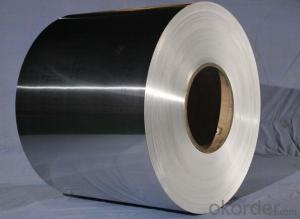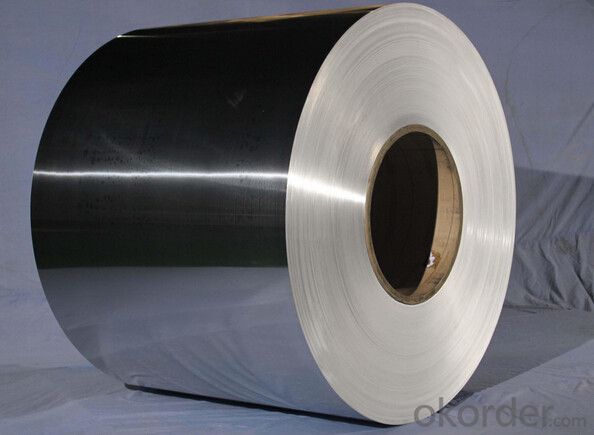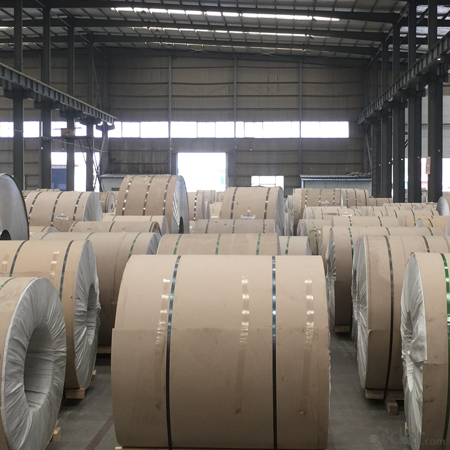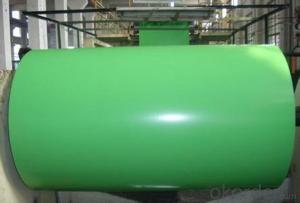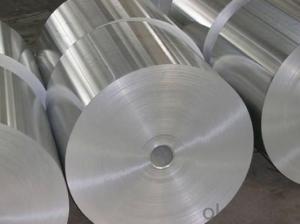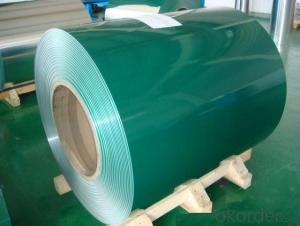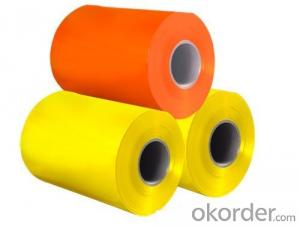Painted Coil Aluminum for Mill Finished Wall Cladding
- Loading Port:
- Shanghai
- Payment Terms:
- TT OR LC
- Min Order Qty:
- 5 m.t.
- Supply Capability:
- 80000 m.t./month
OKorder Service Pledge
OKorder Financial Service
You Might Also Like
Specification
Mill Finished Aluminium Coil For Wall Cladding
Description
Alloy | 1060, 1100, 3003, 8011, etc. |
Temper | H16, H18, H24, H26, H28 |
Thickness | From 0.05mm to 3.0mm |
Width | Standard width:1240mm |
Special width:1300mm, 1520mm, 1570mm, 1595mm | |
Diameter | Standard dia:1200mm |
Interior dia:150mm,405mm,505mm | |
Weight | 2.5 T/coil,3.0 T/coil |
Coating | PE, PVDF, ACRYLIC |
Surface | Embossed, mill finish, coated |
Color | AS to code RAL |
Gloss | 10-90%(EN ISO-2813:1994) |
Coating Thickness | PE: more than 18 micron |
PVDF: more than 25 micron | |
Coating Hardness(pencil resistance) | More than 2h |
Coating adhesion | 5J (EN ISO-2409:1994) |
Impact Resistance | No peeling or cracking(50 kg/cm,ASTMD-2794:1993) |
Flexibility(T-bend) | 2T |
MEK resistance | More than 100 |
Advantage | 1.High temperature resistant 2.Weathering resistant 3.Scrubbing resistant 5.Acid or alkali proof 6. Fireproof 7.Light weight material is easy to construct and install |
Out package | Wooden splint with export standard |
Application | ACP, wall cladding, facades, roofs and canopies, ceilings, signboards, blind window, display platforms, electrical panels, etc |
Manufacturing
Decoiler → Accumulator →Tension Leveler →Acid & Alkali Cleaner → Rinse →Conversion Treatment → Priming coater →Infrared Curing Oven →Main coater →Floatation Curing Oven →Strippable Film Applicator → Exit Accumulator → Recoiler
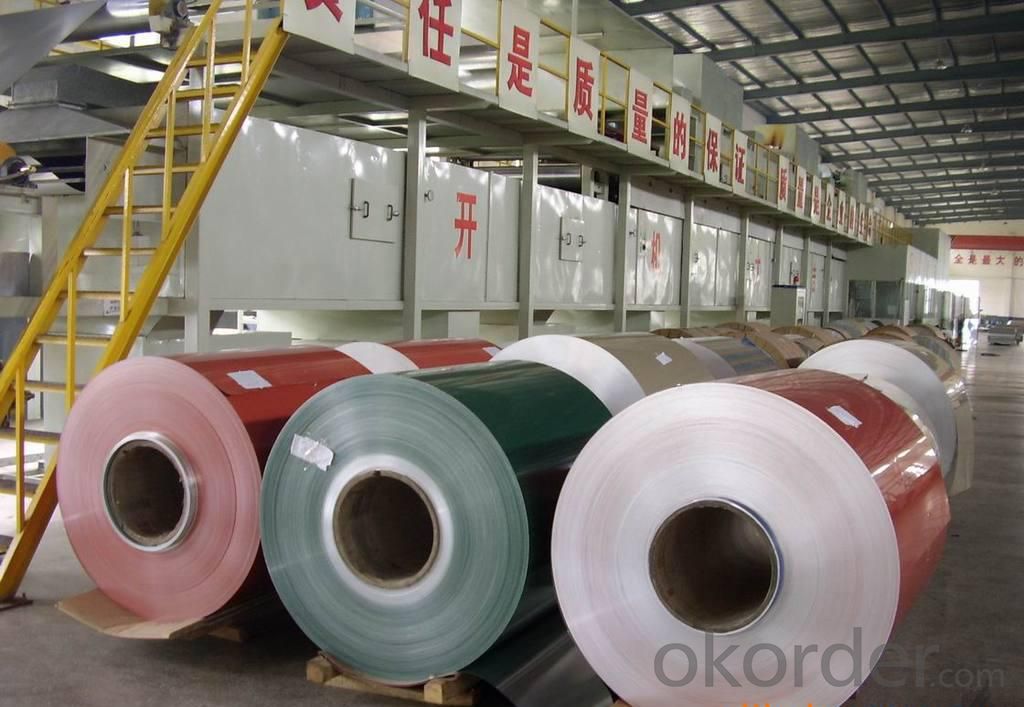
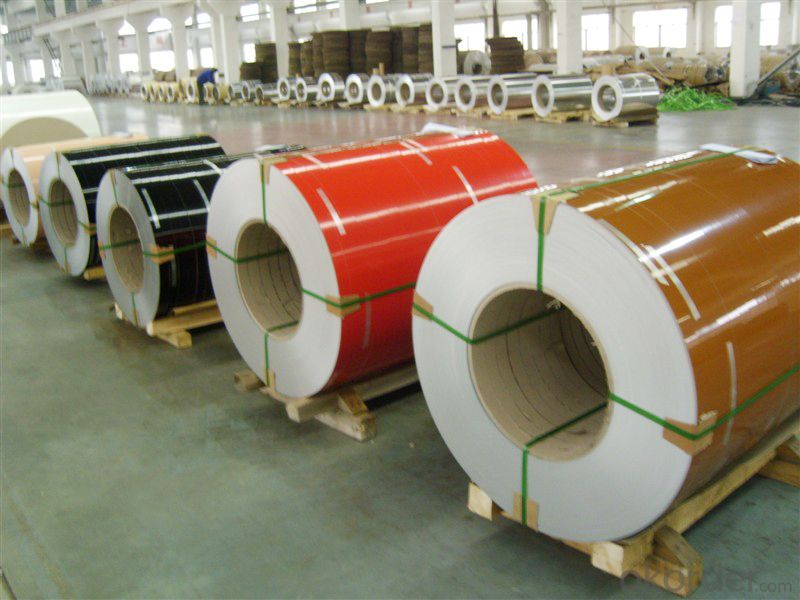
FAQ
--Q: Do you provide free samples?
--A: Yes, free samples will be sent to you on freight at destination.
--Q: Can I get your latest products catalogue?
--A: Yes, it will be sent to you in no time.
--Q: What is the MOQ?
--A: 2 tons
--Q: What are your payment terms?
--A: We accept L/C, T/T.
--Q: What kinds of alloy can you supply?
--A: 1000 series: 1050, 1060, 1070, 1100, 1145, 1200
3000 series: 3003, 3004, 3105, 3104
5000 series: 5052, 5083, 5754, 5182
6000 series: 6061, 6063, 6062, 6063
8000 series: 8011, 8021
--Q: What kinds of temper can you supply?
--A: O-H112: O,H12,H14,H16,H18,H22,H24,H26,H,32,H34,H111,H112
T3, T4, T6
- Q: How are aluminum coils joined or welded?
- Aluminum coils can undergo various methods of joining or welding, depending on the specific application and desired outcome. Some commonly employed techniques are: 1. Mechanical fastening: This involves physically fastening the aluminum coils together using bolts, screws, or rivets. Mechanical fastening is a cost-effective and straightforward method suitable for thin coils or temporary connections. 2. Adhesive bonding: Specialized adhesives are used to bond aluminum coils together in adhesive bonding. This method creates a strong and durable joint, evenly distributing stress across the entire bond area. Adhesive bonding is often used when aesthetics, weight reduction, or vibration dampening are important considerations. 3. Resistance welding: Resistance welding employs an electric current to generate heat and pressure at the joint, effectively welding the aluminum coils. This method is particularly suitable for high-speed production lines, providing a strong and reliable joint. However, it requires specialized equipment and may not be suitable for all aluminum alloys. 4. Laser welding: Laser welding is a precise and efficient method that utilizes a laser beam to melt and join the aluminum coils. This technique allows for precise control of heat input, resulting in minimal distortion and excellent weld quality. Laser welding is commonly used in industries where high precision and aesthetic appearance are crucial, such as automotive and aerospace. 5. Friction stir welding: Friction stir welding is a solid-state joining process that employs a rotating tool to generate heat and friction, effectively welding the aluminum coils without melting the material. This method produces strong and high-quality welds with minimal distortion and no need for additional filler material. Friction stir welding is commonly used in industries that require excellent mechanical properties and high productivity, such as shipbuilding and railway construction. Overall, the choice of joining or welding method for aluminum coils depends on factors such as desired joint strength, application requirements, production volume, and available equipment and expertise.
- Q: Are aluminum coils suitable for high-strength applications?
- In comparison to materials like steel, aluminum coils generally have a lower tensile strength, making them unsuitable for high-strength applications. Additionally, aluminum is more susceptible to deformation when exposed to heavy loads due to its lower strength-to-weight ratio. Nonetheless, there are certain aluminum alloys like the 7000 series that have been developed to increase their strength, making them suitable for industries like aerospace and automotive that prioritize lightweight properties and moderate strength. However, when it comes to applications that demand the highest level of strength, steel or other high-strength materials are typically preferred over aluminum coils.
- Q: Why 5052 turn black after annealing during the production of aluminum alloy?
- The aluminum oxide in the surface has been oxidized by other chemical elements.
- Q: Are there any restrictions on the coil surface quality of aluminum coils?
- Yes, there are certain restrictions on the coil surface quality of aluminum coils. The surface quality of aluminum coils is an important factor as it affects the overall performance and appearance of the final product. Some of the restrictions on the coil surface quality include: 1. Surface defects: Aluminum coils should be free from any visible defects such as scratches, pits, dents, or cracks. These defects can impact the functionality of the coil and can also affect the aesthetics of the finished product. 2. Surface roughness: The surface of aluminum coils should have a uniform and smooth finish. Excessive roughness can lead to poor adhesion of coatings or paints, and can also affect the ability of the coil to be formed into desired shapes. 3. Surface cleanliness: Aluminum coils should be free from any contaminants such as dirt, oil, or grease. Contaminants can interfere with subsequent processes like painting, coating, or bonding, and can also impact the overall performance of the coil. 4. Surface oxidation: Aluminum is prone to oxidation, which can result in the formation of a thin layer of oxide on the surface. While a certain level of oxidation is acceptable, excessive oxidation can lead to poor adhesion of coatings or paints, and can also affect the corrosion resistance of the coil. 5. Surface flatness: Aluminum coils should have a flat and even surface. Any waviness or unevenness can cause issues during subsequent manufacturing processes like stamping, bending, or rolling. These restrictions on coil surface quality are important to ensure that the aluminum coils meet the desired specifications and can be used effectively in various applications such as automotive, construction, packaging, and electrical industries.
- Q: Are there any health concerns associated with aluminum coils?
- There are some health concerns associated with aluminum coils, but they are generally considered to be minimal. Aluminum coils are commonly used in HVAC systems and refrigerators, and there have been some concerns regarding potential health risks related to the release of aluminum particles into the air or food. However, studies have shown that the amount of aluminum released from these coils is typically very low and does not pose significant health risks. While aluminum is a known neurotoxin, the levels of aluminum exposure from aluminum coils are generally well below the threshold that could cause harm. The World Health Organization (WHO) has set a provisional tolerable weekly intake for aluminum, and the amount typically released from aluminum coils is significantly below this level. It is important to note that individuals with certain health conditions, such as kidney disease or aluminum sensitivity, may be more susceptible to the potential health effects of aluminum exposure. In such cases, it is advisable to consult with a healthcare professional or an HVAC specialist to determine the best course of action. Overall, while there are some health concerns associated with aluminum coils, they are generally considered to be minimal and unlikely to pose significant risks to the general population. Regular maintenance and proper installation of HVAC systems can help minimize any potential risks and ensure the safe and efficient operation of aluminum coils.
- Q: Can aluminum coils be used for HVAC condenser coils?
- Yes, aluminum coils can be used for HVAC condenser coils. Aluminum is a popular choice for condenser coils due to its excellent heat transfer properties, durability, and resistance to corrosion. Additionally, aluminum coils are lightweight, making them easier to install and transport.
- Q: Are there any restrictions on the coil length of aluminum coils?
- Yes, there are restrictions on the coil length of aluminum coils. The coil length is limited by factors such as the manufacturing process, transportation constraints, and handling capabilities. These restrictions ensure that the coils can be efficiently produced, transported, and utilized in various applications.
- Q: Are aluminum coils suitable for low-maintenance applications?
- Yes, aluminum coils are suitable for low-maintenance applications. Aluminum is known for its durability and resistance to corrosion, making it an excellent choice for applications that require minimal upkeep. Unlike other materials, such as steel, aluminum coils do not rust or require regular painting to maintain their appearance. Additionally, aluminum is lightweight, which can make installation and handling easier, especially in low-maintenance applications where frequent maintenance may not be feasible or desirable. Overall, aluminum coils offer a reliable and low-maintenance solution for various applications.
- Q: Describe the manufacturing steps involved in producing aluminum coils.
- <p>The production processes of aluminum coils involve several key steps. Initially, aluminum ingots are melted in a furnace. The molten aluminum is then transferred to a casting machine where it is cast into a continuous strip. This strip is cooled and passed through a series of rollers to reduce its thickness and achieve the desired coil gauge. The rolling process can be hot or cold, depending on the final product's properties. After rolling, the aluminum coil may undergo annealing to improve its ductility and strength. It is then cleaned, oiled, and wound into coils. Quality control checks are performed throughout the process to ensure the coils meet specific standards. Finally, the aluminum coils are packaged and shipped for various applications such as construction, automotive, and packaging industries.</p>
- Q: Can aluminum coils be painted?
- Indeed, it is possible to paint aluminum coils. By applying paint to aluminum coils, an extra layer of protection against corrosion can be achieved, along with an improvement in their aesthetic appearance. Nevertheless, it is crucial to properly prepare the surface prior to painting in order to ensure a strong adhesion and durability. This typically involves a thorough cleaning of the coils, the removal of any existing paint or coatings, and the application of a primer specifically designed for aluminum surfaces. Once the primer has dried, a suitable paint can be applied using a brush, roller, or spray. For optimal and long-lasting results, it is advisable to use a high-quality paint specially formulated for metal surfaces. Additionally, following the instructions provided by the manufacturer and taking into account any environmental factors, such as temperature and humidity, that could impact the painting process, is of utmost importance.
Send your message to us
Painted Coil Aluminum for Mill Finished Wall Cladding
- Loading Port:
- Shanghai
- Payment Terms:
- TT OR LC
- Min Order Qty:
- 5 m.t.
- Supply Capability:
- 80000 m.t./month
OKorder Service Pledge
OKorder Financial Service
Similar products
Hot products
Hot Searches
Related keywords
